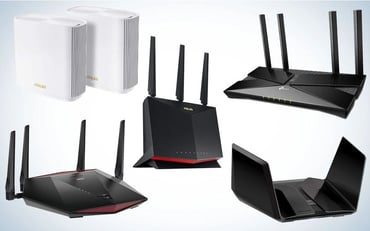External Hard Drives vs. NAS: Data Storage Options
Table of Contents
Introduction: Understanding Data Storage Options
When it comes to storing your data, there are several options available to you. Two popular choices are external hard drives and Network Attached Storage (NAS) devices. Each option has its own advantages and considerations, and understanding them can help you make an informed decision about which one is right for your needs.
An external hard drive is a portable device that can be connected to your computer via USB or Thunderbolt. It provides you with extra storage space and allows you to keep your files, documents, photos, and videos in one place. External hard drives are easy to use, affordable, and offer a high level of flexibility. You can easily disconnect them and take them anywhere you go, making it a convenient option for those who need to access their data on the go.
On the other hand, NAS devices are more advanced storage solutions that connect to your network rather than directly to your computer. They are essentially small servers that allow multiple devices to access and share files simultaneously. NAS devices offer features like data redundancy, remote access, and the ability to create backups. They are ideal for small businesses or households with multiple users who need centralized and shared storage.
When considering external hard drives, it’s important to note that they are primarily designed for individual use and may not offer the same level of security and advanced features as NAS devices. However, they are generally more cost-effective and easier to set up and maintain.
On the other hand, NAS devices offer a higher level of data protection through RAID configurations, which distribute data across multiple drives for redundancy. They also provide additional features like media streaming, remote access, and the ability to expand storage capacity as your needs grow.
Ultimately, the choice between external hard drives and NAS devices depends on your specific requirements and budget. If you need simple, portable storage with easy access, an external hard drive may be the best choice. However, if you require centralized, shared storage with advanced features and data protection, a NAS device would be a better fit.
- External Hard Drives:
- Portable and easy to use
- Affordable
- Flexible and portable
- NAS Devices:
- Advanced storage solution
- Multiple device access and sharing
- Data redundancy and protection
- Additional features like media streaming and remote access
Exploring External Hard Drives
External hard drives are a popular choice for individuals and businesses looking to expand their data storage options. These compact and portable devices offer a convenient way to store and access large amounts of data. Here are some key features and benefits of external hard drives:
- Portability: One of the main advantages of external hard drives is their portability. They are compact and lightweight, making it easy to carry them around and transfer data between different devices.
- Storage Capacity: External hard drives come in various storage capacities, ranging from a few hundred gigabytes to several terabytes. This allows you to choose a drive that meets your specific storage needs.
- Data Backup: External hard drives are an excellent solution for backing up important data. You can easily schedule regular backups or manually transfer files to ensure that your data is protected in case of system failures or accidental deletion.
- Speed and Performance: Most external hard drives use USB 3.0 or Thunderbolt interfaces, which offer high-speed data transfer rates. This makes it faster to transfer large files or access data stored on the drive.
- Compatibility: External hard drives are compatible with various operating systems, including Windows, macOS, and Linux. This makes it easy to use the drive with different devices and share data across platforms.
However, there are a few limitations to consider when using external hard drives:
- Physical Damage: External hard drives are susceptible to physical damage from drops, bumps, or other accidents. It is important to handle them with care and consider investing in shock-resistant or rugged drives for added protection.
- Single Point of Failure: Since external hard drives are standalone devices, they represent a single point of failure. If the drive fails or gets lost, you may risk losing all the data stored on it. Regular backups and redundancy measures are essential to mitigate this risk.
Overall, external hard drives offer an affordable and flexible data storage option, particularly for individuals and small businesses. They provide a convenient way to expand storage capacity, back up data, and easily transfer files between devices. However, it is important to consider the limitations and take appropriate measures to protect your data.
Unveiling Network Attached Storage (NAS)
Network Attached Storage (NAS) is a data storage solution that offers several advantages over traditional external hard drives. NAS devices are essentially dedicated file servers that can be connected directly to your network, providing a centralized storage solution for multiple devices. Here are some key points to consider when exploring the world of NAS:
- Centralized Storage: One of the primary benefits of NAS is the ability to centralize your data storage. Instead of having multiple external hard drives scattered across different devices, NAS allows you to store all your data in one central location. This makes it easier to access and manage your files, especially if you have multiple devices in your network.
- Network Accessibility: NAS devices can be accessed from any device connected to the same network. This means that you can easily share files between different computers, laptops, smartphones, and tablets without the need for physical transfer. With NAS, you can also remotely access your files over the internet, providing flexibility and convenience.
- Data Redundancy: NAS devices often support RAID (Redundant Array of Independent Disks) configurations, which provide data redundancy and protection against drive failures. By distributing your data across multiple drives, NAS can ensure that your files are safe even if one drive fails. This is particularly important for businesses and individuals who rely heavily on their data.
- Expandability: NAS devices typically offer options for expanding storage capacity. Whether through additional hard drive bays or external expansion units, you can easily increase the storage space as your needs grow. This scalability makes NAS a cost-effective solution in the long run, as you can avoid purchasing multiple external hard drives.
- Advanced Features: NAS devices often come with advanced features such as built-in media servers, file synchronization, remote backup, and even support for virtualization. These additional functionalities enhance the overall usability and versatility of NAS, making it a valuable investment for both home and business users.
While external hard drives have their own benefits, NAS stands out as a more comprehensive and efficient solution for data storage. With its centralized storage, network accessibility, data redundancy, expandability, and advanced features, NAS offers a robust and reliable storage option for individuals and businesses alike.
Comparing Performance and Features
When it comes to choosing between external hard drives and network-attached storage (NAS) for data storage, it’s important to consider the performance and features each option offers. Here, we compare the two to help you make an informed decision:
- Storage Capacity: External hard drives typically offer larger storage capacities compared to NAS devices. If you require a significant amount of storage space, an external hard drive might be the better choice.
- Access Speed: External hard drives provide faster access speeds since they are directly connected to your computer via USB or Thunderbolt. On the other hand, NAS devices rely on your network connection, which can affect the speed of data transfer.
- Accessibility: External hard drives are portable and can be easily disconnected from one device and connected to another. This makes them convenient for individuals who need to access their data on multiple devices. NAS devices, on the other hand, are designed to be always-on and accessible to multiple users simultaneously.
- Backup and Redundancy: NAS devices often offer more advanced backup and redundancy features compared to external hard drives. They can be configured to automatically backup your data and provide RAID options for data redundancy, ensuring that your data is protected in case of a drive failure.
- Remote Access: NAS devices allow for remote access, meaning you can access your data from anywhere with an internet connection. This feature can be beneficial for remote workers or those who need to access their data on the go. External hard drives, however, require physical connection to access the data.
Ultimately, the choice between external hard drives and NAS devices depends on your specific needs. If you require high storage capacity, portability, and fast access speeds, an external hard drive might be the better option. However, if you need advanced backup features, remote access, and the ability to share data with multiple users, a NAS device would be more suitable.
Consider your requirements and budget before making a decision, and always prioritize the security and reliability of your data storage solution.
Making the Right Choice
When it comes to data storage options, external hard drives and Network Attached Storage (NAS) are two popular choices. Both offer their own set of advantages and it’s important to understand your specific needs before making a decision.
Here are some factors to consider when deciding between an external hard drive and a NAS:
- Storage Capacity: If you require a large amount of storage space, a NAS might be the better option. NAS devices typically offer multiple drive bays, allowing for expansion and higher storage capacities compared to external hard drives.
- Accessibility: External hard drives are portable and can be easily connected to any computer via USB. This makes them convenient for individuals who need to access their data on the go. On the other hand, NAS devices are designed to be connected to a network and accessed by multiple users simultaneously.
- Backup and Data Redundancy: NAS devices often come with built-in redundancy features, such as RAID configurations, which provide data protection in case of drive failures. This makes them a reliable choice for those who prioritize data backup and security. External hard drives, on the other hand, require manual backups and do not offer the same level of protection.
- Cost: External hard drives are generally more affordable than NAS devices, especially for smaller storage capacities. However, if you require a significant amount of storage space or advanced features, the cost of a NAS device may be justified in the long run.
- Ease of Use: External hard drives are typically plug-and-play devices, requiring no additional setup. NAS devices, on the other hand, may require some initial configuration to set up the network and user permissions.
Ultimately, the choice between an external hard drive and a NAS depends on your specific needs and budget. If you require a portable and cost-effective solution for personal use, an external hard drive may be sufficient. However, if you need a robust storage solution for multiple users with advanced features like data redundancy, a NAS device is the way to go.
Consider evaluating your storage requirements and weighing the pros and cons of each option before making your final decision.



























